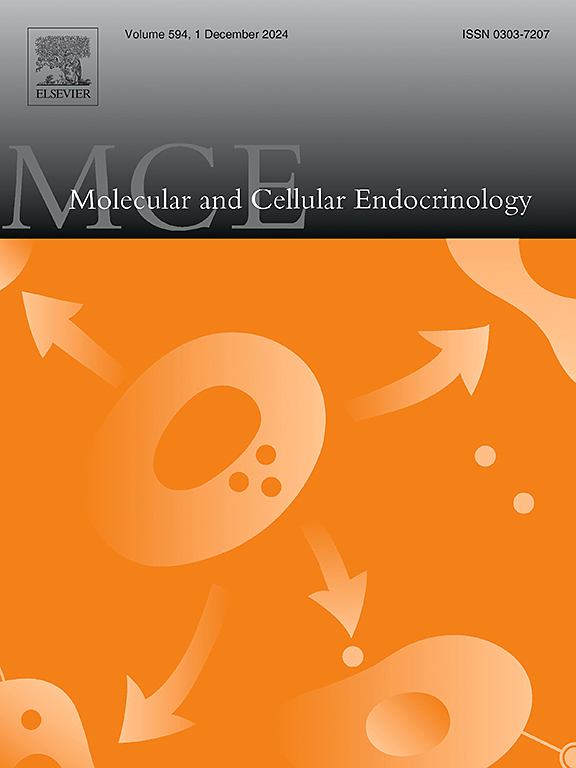SP600125 decreases cAMP/PKA-dependent steroid production through ATF4/DDIT3 activation in MA-10 Leydig cells
IF 3.6
3区 医学
Q2 CELL BIOLOGY
引用次数: 0
Abstract
Leydig cells, located between seminiferous tubules within the testis, are the primary source of testosterone in males. In these cells, the luteinizing hormone (LH)/cAMP/protein kinase A (PKA) signaling pathway mainly regulates androgen biosynthesis. We have previously reported that the connexin43 (Gja) promoter can be activated in mouse MA-10 Leydig cells as a result of a cooperation between the AP-1 transcription factors JUN and FOS. The mitogen-activated protein kinases (MAPK) signaling pathway, through the JUN N-terminal kinase (JNK), can phosphorylate members of the AP-1 family of transcription factors, modulating their activities. Hence, MA-10 Leydig cells were treated for 4 h with the JNK inhibitor SP600125 (pyrazolanthrone) at 25 μM, in the absence or presence of the activator of adenylate cyclase forskolin (FSK) at 10 μM, followed by RNA extractions and 3′Tag RNA-Seq analysis of the transcriptome. Interestingly, SP600125 decreases cAMP/PKA dependent expression of genes related to cholesterol and steroid biosynthetic/metabolic processes, resulting in decreased cAMP/PKA dependent progesterone production in MA-10 cells. Moreover, SP600125 increases the expression of genes involved in the endoplasmic reticulum stress response related to ATF4, resulting in activation of DDIT3 and apoptosis as indicated with cleaved caspase 3. Overall, our results suggest that SP600125 increases the ATF4/DDIT3-dependent endoplasmic reticulum stress response independently of MAPK9 (JNK2) inhibition, and inhibits LH/cAMP/PKA-dependent androgen synthesis in Leydig cells.
SP600125通过ATF4/DDIT3激活MA-10间质细胞,减少cAMP/ pka依赖性类固醇的产生
睾丸间质细胞位于睾丸内的精小管之间,是男性睾酮的主要来源。在这些细胞中,黄体生成素(LH)/cAMP/蛋白激酶A (PKA)信号通路主要调控雄激素的生物合成。我们之前报道过连接蛋白43 (connexin43, Gja)启动子可以在小鼠MA-10间质细胞中被激活,这是AP-1转录因子JUN和FOS之间合作的结果。丝裂原活化蛋白激酶(MAPK)信号通路通过JUN n端激酶(JNK)磷酸化AP-1转录因子家族成员,调节其活性。因此,MA-10间质细胞被JNK抑制剂SP600125 (pyrazolanthrone)在25 μM下处理4小时,在10 μM下不存在腺苷酸环化酶forskolin (FSK)激活剂,然后提取RNA并对转录组进行3'Tag RNA- seq分析。有趣的是,SP600125降低了cAMP/PKA依赖性胆固醇和类固醇生物合成/代谢过程相关基因的表达,导致MA-10细胞中cAMP/PKA依赖性孕酮产生减少。此外,SP600125增加了与ATF4相关的内质网应激反应相关基因的表达,导致DDIT3的激活和凋亡,如cleaved caspase 3所示。总之,我们的研究结果表明,SP600125增加ATF4/ ddit3依赖性内质网应激反应,独立于MAPK9 (JNK2)抑制,并抑制间质细胞LH/cAMP/ pka依赖性雄激素合成。
本文章由计算机程序翻译,如有差异,请以英文原文为准。
求助全文
约1分钟内获得全文
求助全文
来源期刊

Molecular and Cellular Endocrinology
医学-内分泌学与代谢
CiteScore
9.00
自引率
2.40%
发文量
174
审稿时长
42 days
期刊介绍:
Molecular and Cellular Endocrinology was established in 1974 to meet the demand for integrated publication on all aspects related to the genetic and biochemical effects, synthesis and secretions of extracellular signals (hormones, neurotransmitters, etc.) and to the understanding of cellular regulatory mechanisms involved in hormonal control.
 求助内容:
求助内容: 应助结果提醒方式:
应助结果提醒方式:


